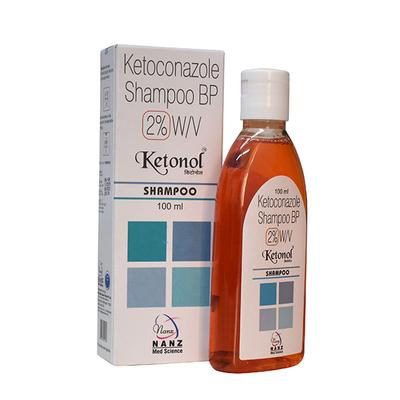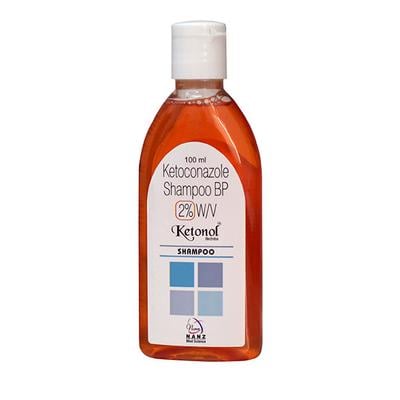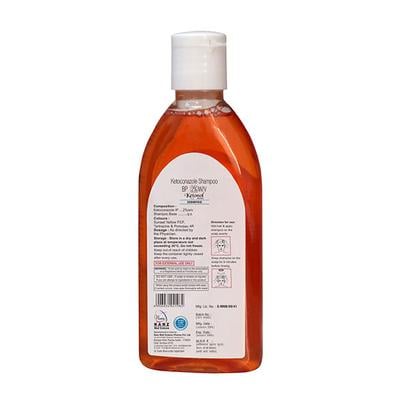

Netmeds First Membership
Quick Links
Introduction About KETONOL SHAMPOO
KETONOL SHAMPOO contains Ketoconazole which belongs to the group of medicines called Antifungals. It is used to manage fungal infections on scalp and body such as dandruff, seborrheic dermatitis (a dry or oily scaling of the scalp and other parts of the body) and tinea versicolor.
These conditions can be itchy and are caused by a fungus called Malassezia. Tinea versicolor is characterised by white to brown patches on the body that sometimes appear after exposure to the sun.
Before using KETONOL SHAMPOO, inform your doctor if you have any liver problems or if you are using any steroids. KETONOL SHAMPOO can be used by pregnant and breastfeeding women, but consult your doctor for advice. KETONOL SHAMPOO should not be used in infants or children.
The most common side effects of using KETONOL SHAMPOO are itching, stinging, and dryness at the site of application. Call your doctor if any of the symptoms get worse.
Uses Of KETONOL SHAMPOO
Manages fungal infections like
- dandruff
- seborrheic dermatitis
- tinea versicolor
How KETONOL SHAMPOO Works
KETONOL SHAMPOO works by arresting growth in fungal cells thus, managing growth and spread of the fungus throughout your body.
How to use KETONOL SHAMPOO
Use KETONOL SHAMPOO as advised by your physician. It is for use on hair and skin only. Wet your hair and scalp thoroughly with water, and apply a sufficient amount of soap to produce enough lather. Smoothly massage the lather over the entire scalp. Allow for 3-5 minutes before thoroughly washing off.
If KETONOL SHAMPOO accidentally gets in your eye, gently rinse your eyes with cold water. Do not swallow it. Your doctor will determine the right dose and duration of therapy for you according to your age, body weight, and disease condition.
Side Effects Of KETONOL SHAMPOO
Common
- itching, stinging and dryness on the site of application
Uncommon
- infection of the hair roots
- increased production of tears
- abnormal hair loss or thinning
- dry skin, rash, burning feeling
- your hair feeling different
Rare
- taste impairment
- irritation of the eyes
- acne
- flaking skin
Stop using KETONOL SHAMPOO and contact your doctor immediately if you experience any of the following side effects:
- allergic reaction (swelling of the face, lips, mouth, tongue, or throat which may cause trouble in swallowing or breathing)
- severe irritation or reddening of the skin on the applied area
- peeling or blistering of the skin
How To Manage Side Effects
Skin rash Or Itching
Do not share vessels, personal items, or cosmetics with others. Use disinfectants on objects you use in public spaces, such as gym equipment. Drink sufficient water and have a nutritious diet. Do not use irritants or harsh chemicals. Sleep seven to eight hours every night. Use sunscreens to manage sunburn and other sun damage. Wash hands regularly with soap and water.
Warning & Precautions
Pregnancy
Use with CautionKETONOL SHAMPOO can generally be used in pregnant women, however, consult your doctor before using it.
Breastfeeding
Use with CautionKETONOL SHAMPOO can generally be used in breastfeeding women, however, consult your doctor before using it.
Driving and Using Machines
Use with CautionKETONOL SHAMPOO is unlikely to affect your ability to drive or to use machinery.
Liver
ContraindicatedKETONOL SHAMPOO is not recommended for use in patients with acute or chronic liver disease. Consult your doctor before using it.
Allergy
ContraindicatedDo not use KETONOL SHAMPOO if you are allergic to Ketoconazole or any of the other ingredients of this medicine.
Use In Pediatrics
ContraindicatedKETONOL SHAMPOO is not recommended for use in infants and children. Consult your child’s doctor for advice.
Use In Geriatrics
Use with CautionKETONOL SHAMPOO should be used with caution in elderly patients. Consult your doctor before taking it.
Interactions
A. Drug - Drug interactions:
Before using KETONOL SHAMPOO, inform your doctor if you are using the following medicine:
- medicines used in inflammatory conditions (Ex. betamethasone, hydrocortisone)
Overdosage:
If you or anyone else accidentally use too much of KETONOL SHAMPOO, consult your doctor immediately or visit the nearby hospital.
Synopsis
| Drug | : | Ketoconazole |
| Pharmacological Category | : | Azole antifungal |
| Therapeutic Indication | : | Fungal infections |
| Dosage Forms | : | Tablet, Solution, Scalp solution, Cream, Gel, Lotion, Ointment, Shampoo, Soap, Body wash, Bar, Eye drops, Dusting powder, Scrub |
More Information
- Keep KETONOL SHAMPOO out of reach from children
- Do not store above 25°C
FAQs About KETONOL SHAMPOO
Q: Can KETONOL SHAMPOO interact with other medicines?
A: Before using KETONOL SHAMPOO, inform your doctor if you have been using steroid medicines such as betamethasone or hydrocortisone for a long period of time, as these might interact with each other. You must gradually reduce their use over 2 to 3 weeks as you start to use KETONOL SHAMPOO. Also inform your doctor if you are taking, have taken, or might take any other medicine, including prescription, over-the-counter, or herbal medicine.
Q: How often should I use KETONOL SHAMPOO?
A: For dermatitis and dandruff, use KETONOL SHAMPOO twice weekly for 2–4 weeks. For tinea, use once daily for a maximum of 5 days. However, the dose and duration might differ for each patient, so consult your doctor before using it. Your doctor will determine the right dose and duration of therapy for you according to your age, body weight, and disease condition.
Q: What if KETONOL SHAMPOO gets in my eye?
A: Use KETONOL SHAMPOO with care and avoid getting it in your eyes or mouth. If it gets in your eye, gently rinse your eyes with cold water. If any discomfort persists, consult your doctor.
Q: What if I swallow KETONOL SHAMPOO?
A: Accidental swallowing of small quantities of KETONOL SHAMPOO is usually harmless, but consult your doctor or go to the nearest hospital immediately in case you swallow it.
Q: What if I forget to use KETONOL SHAMPOO?
A: If you forget to use KETONOL SHAMPOO, use it as soon as you remember, and then continue your management as usual. Do not use the medicine twice to make up for the missed management.
References
1. KD Tripathi. Antifungal Drugs. Essentials of medical pharmacology. Seventh edition. 2013. Page – 791, 792.
2. Choi FD, Juhasz MLW, Atanaskova Mesinkovska N. Topical ketoconazole: a systematic review of current dermatological applications and future developments. NIH National Library of Medicine. National Centre for Biotechnology Information. PMC PubMed.gov. December 2019. [Accessed on 13th October 2022] https://pubmed.ncbi.nlm.nih.gov/30668185/
3. Hadeer Sinawe, Damian Casadesus. Ketoconazole. NIH National Library of Medicine. National Centre for Biotechnology Information. StatPearls [Internet]. June 2022. [Accessed on 13th October 2022] https://www.ncbi.nlm.nih.gov/books/NBK559221/
4. Janssen Pharmaceutica NV. Electronic Medicines Compendium (EMC). [Revised in July 2020] [Accessed on 13th October 2022] https://www.medicines.org.uk/emc/files/pil.1510.pdf
5. Pinewood Laboratories Ltd. Health Products Regulatory Authority (HPRA). [Revised in May 2020] [Accessed on 13th October 2022] http://www.hpra.ie/img/uploaded/swedocuments/83695f95-ccd3-4e5e-91fe-11fd592f9721.pdf
6. Nanz MedScience Pharma (P) Ltd. Ketonol (Anti-dandruff Scalp Solution). [Accessed on 13th October 2022] https://nanzpharma.com/hospiaid/
7. Alniche Life Sciences Pvt. Ltd. Nizral 2%. [Accessed on 13th October 2022] https://www.alniche.com/product/nizral-2/
8. Ketoconazole. Drugbank. [Accessed on 13th October 2022] https://go.drugbank.com/drugs/DB01026









